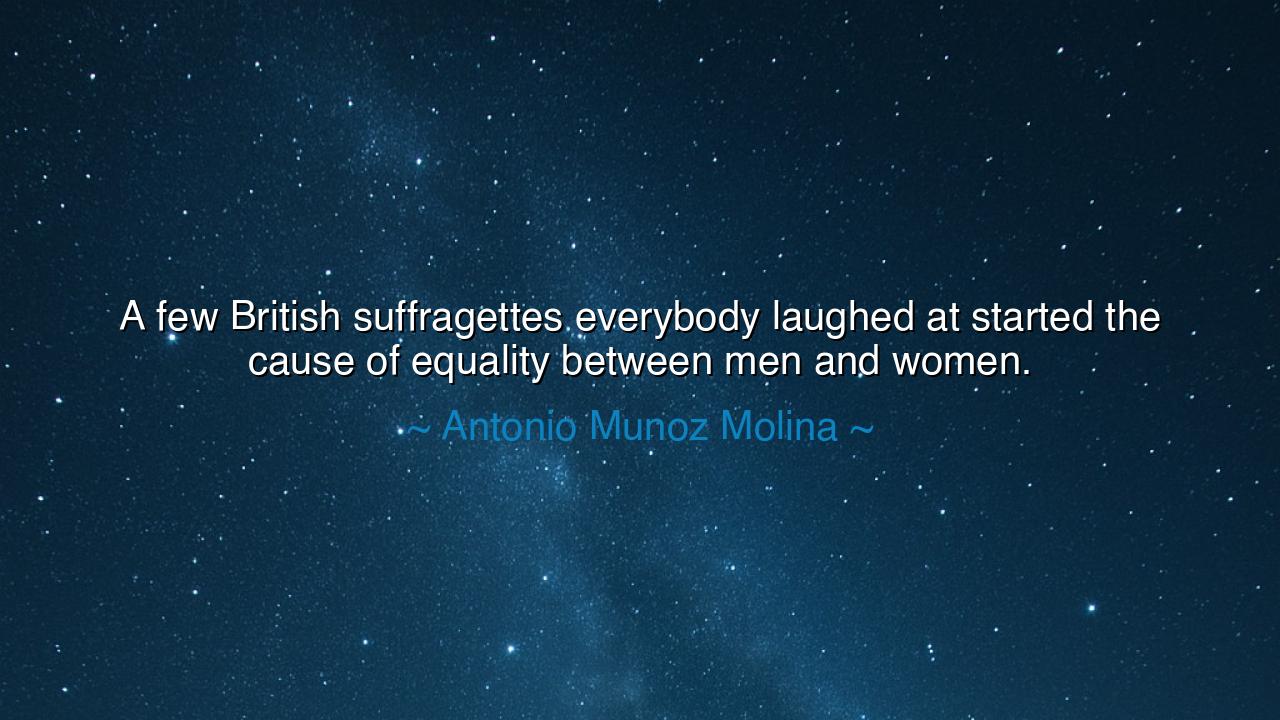
A few British suffragettes everybody laughed at started the cause
A few British suffragettes everybody laughed at started the cause of equality between men and women.






In the reflective and powerful words of Antonio Muñoz Molina, there resounds a deep reverence for courage born in ridicule: “A few British suffragettes everybody laughed at started the cause of equality between men and women.” In this statement, Molina honors not only the movement but the spirit that ignited it—the fire that burned in the hearts of a few women who dared to defy an empire. His words remind us that history’s greatest revolutions often begin not with applause, but with mockery and resistance. For those who challenge the established order must first endure the laughter of those who cannot yet imagine change.
The meaning of this quote lies in its recognition that progress is often seeded by those who are dismissed and misunderstood. The British suffragettes, led by women such as Emmeline Pankhurst, Christabel Pankhurst, and Emily Wilding Davison, were ridiculed, imprisoned, and beaten for daring to demand a simple truth—that women are equal to men. They were called hysterical, unladylike, even dangerous. Yet, in their persistence, they revealed the moral blindness of their age. Molina’s words exalt this paradox: that those whom the world mocks today may be the ones whose courage redeems it tomorrow. For the laughter of ignorance is but the beginning of wisdom’s dawn.
The origin of this truth reaches into the soil of early twentieth-century England, where the fight for women’s suffrage became a crucible for justice. The suffragettes did not simply argue with words—they waged a campaign of relentless action. They marched in the streets, chained themselves to gates, and endured force-feeding during hunger strikes in prison. Their sacrifices stirred the conscience of a nation that had long silenced half its voice. It is this history that Molina reveres, for from that small, scorned beginning grew the vast and unstoppable current of gender equality that has since reshaped the modern world.
One of the most poignant moments in that struggle came through the act of Emily Davison, who in 1913 stepped onto the track of the Epsom Derby and was struck down by the King’s horse. Many thought her mad, yet her death became a symbol of sacrifice that awakened millions. The image of her courage—of a woman giving her life to awaken a sleeping conscience—stands as a testament to the cost of progress. Like prophets and visionaries of old, she was mocked in life but honored in death. Her act, though tragic, became a spark that illuminated the path toward justice and equality.
Molina’s reflection speaks, too, to a universal pattern in human history: that those who challenge injustice are often met first with ridicule, then resistance, and only later with reverence. The abolitionists, the reformers, the visionaries—all have walked this path. The laughter of their contemporaries is the veil through which truth first appears. Thus, the suffragettes join a sacred lineage of the brave—those who stand firm not because they are assured of victory, but because their hearts cannot bear silence in the face of wrong.
His words also remind us that true equality is not given—it is fought for. The cause the suffragettes began did not end with the right to vote; it continues wherever women and men struggle for dignity and fairness. The laughter that once met their cause still echoes, in different forms, wherever justice challenges complacency. Molina’s quote, therefore, is not only an homage to history but a call to perseverance. It asks each generation: will you stand with those who laugh, or with those who labor for what is right?
Therefore, O listener, take this lesson into your heart: do not fear the laughter of the world when you speak truth. Every great change begins as folly in the eyes of the comfortable. If you believe in justice, in equality, in the dignity of all souls, then let mockery be your crown of courage. Stand firm, as those British women did, for though they began as few, their courage multiplied across nations and centuries.
And so remember the enduring wisdom of Antonio Muñoz Molina: that the cause of equality—between men and women, between powerful and humble—was kindled by the scorned, the brave, the unyielding. From their laughter rose a revolution, and from their sacrifice, a better world. Let their memory teach us that ridicule is fleeting, but righteousness endures. For when the world mocks the few who dare to dream of justice, it is not they who are foolish—it is the world that is still asleep.






AAdministratorAdministrator
Welcome, honored guests. Please leave a comment, we will respond soon